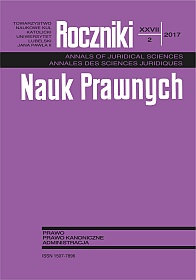The Forgotten Synod of 1938. The Course and Content of the Statutes of the 2nd Synod of the Diocese of Tarnów
Abstract
A council is in general a great human reflection on doctrinal problems and on practices that the Church should incorporate in its mission. At a regional and local level, plenary synods, provincial synods and diocesan synods play an analogous role to ecumenical councils. A special role should be assigned to the diocesan synods because they stem from the needs of a concrete particular Church and by means of formulated disciplinary, pastoral and spiritual proposals, they are instrumental in shaping the ecclesial reality, reaching the very basic Church and social environments. Each synod has its own specific meaning in the history of a given diocese and its impact most definitely is not exhausted only in the letter of formulated proposals.
In 1938, it was ten years since the first synod and, according to the directives of the Code of Canon Law, the bishop of Tarnów was obliged to convene the 2nd Synod of the Diocese of Tarnów. This was not the only motive because in 1936 the First Polish Plenary Synod was held. Therefore, it was only natural to adjust the diocesan law to the resolutions of that synod.
The subject of this article was formulated as follows: „The Forgotten Synod of 1938. The course and content of the statutes of the 2nd Synod of the Diocese of Tarnów”. Why forgotten? So far, four synods were held in our diocese. All studies on synodal legislation in the diocese of Tarnów were based exclusively on three synods. When the second synod was discussed, a laconic comment often occurred that „the statutes of this synod were lost”. There was no research on the reconstruction of that synod’s statutes. The aim of this article is to present the reader with the motives for convening, the course and main problems addressed during the 2nd Synod of the Diocese of Tarnów.
References
Bączkowicz Franciszek, Baron Józef, Stawinoga Władysław: Prawo kanoniczne. Podręcznik dla duchowieństwa, t. I, wyd. 3, Opole: Wydawnictwo Diecezjalne Św. Krzyża 1957.
Dyduch Jan: Synod diecezjalny – narzędziem odnowy Kościoła partykularnego, Prawo Kanoniczne 40 (1997), nr 3-4, s. 23-35.
Kantor Robert: II Synod Diecezji Tarnowskiej o prawach i obowiązkach duchownych. Próba rekonstrukcji nieopublikowanych statutów synodalnych, [w:] Dzieje diecezji tarnowskiej. Instytucje i wydarzenia, t. II, red. A. Gąsior, J. Królikowski, Tarnów: Wydawnictwo Diecezji Tarnowskiej Biblos 2012, s. 133-146.
Kantor Robert: Stanowienie prawa w Kościele partykularnym. Kompetencje synodu diecezjalnego i konferencji biskupów, [w:] Kościół lokalny w Kościele Chrystusa, red. R. Kantor, Kraków: Wydawnictwo Naukowe Uniwersytetu Papieskiego Jana Pawła II 2015, s. 78-93.
Kumor Bolesław: Diecezja tarnowska. Dzieje ustroju i organizacji 1786-1985, Kraków: Polskie Towarzystwo Teologiczne 1985.
Plewa Bogumiła: Pierwszy Synod Diecezji tarnowskiej. Etap przygotowawczy (4 kwietnia 1927-20 czerwca 1928), Tarnowskie Studia Historyczne 3 (2013), s. 122-135.
Plewa Bogumiła: Drugi Tarnowski Synod Diecezjalny. Zapomniane wydarzenie w historii Kościoła lokalnego, Rocznik Tarnowski 19 (2014), s. 53-59.
Rozkrut Tomasz: Synod diecezjalny w Kościele, Tarnów: Wydawnictwo Diecezji Tarnowskiej Biblos 2002.
Sitarz Mirosław: Prawa wiernych świeckich chrześcijan w interpretacji Jana Wiślickiego, [w:] Vir Ecclesiae deditus. Księga dla uczczenia Księdza Profesora Edwarda Góreckiego, red. W. Irek, Wrocław: Papieski Wydział Teologiczny 2011, s. 242-257.
Sitarz Mirosław: Synod diecezjalny w Kodeksie Prawa Kanonicznego z 1983 roku. Zarys problematyki, Biuletyn Stowarzyszenia Kanonistów Polskich 24 (2014), nr 27, s. 91-106.
Sitarz Mirosław: Synod diecezjalny, [w:] Komentarz do Kodeksu Prawa Kanonicznego, t. II/1: Księga II. Lud Boży. Część I. Wierni chrześcijanie. Część II. Ustrój hierarchiczny Kościoła, red. J. Krukowski, Poznań: Pallottinum 2005, s. 333-344.
Copyright (c) 2017 Roczniki Nauk Prawnych

This work is licensed under a Creative Commons Attribution-NonCommercial-NoDerivatives 4.0 International License.


